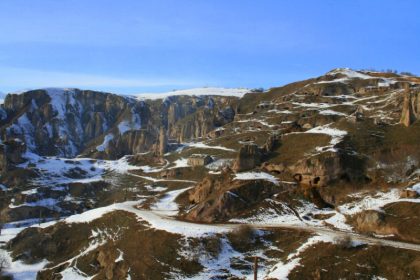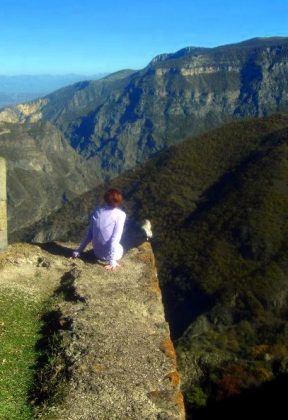Location
Nerkin Khndzoresk, Syunik Marz, Armenia
Community Description
The village of Nerkin Khndzoresk has approximately 320 people. The quaint border village was founded in 1983 as a result of resizing of the bigger village of Khndzoresk. After the creation of Khndzoresk, Nerkin was established to strengthen the Southeastern borders of Armenia and was strategically placed below the larger village to prevent enemies from attacking. However, any expansion and maintenance of the area ceased after the fall of the Soviet Union.
The village resides about 7 km from Khndzoresk by one bumpy, hole-filled road and is 21 km from the city of Goris. Subsistence farming and animal breeding are the main sources of livelihood.
 Nerkin Khndzoresk is currently suffering a deficiency of natural resources, lack of transportation, unemployment, and an aging infrastructure. As with many other villages in previous USSR countries, the community water supply and water drainage systems collapsed after the fall of the Soviet times.
Nerkin Khndzoresk is currently suffering a deficiency of natural resources, lack of transportation, unemployment, and an aging infrastructure. As with many other villages in previous USSR countries, the community water supply and water drainage systems collapsed after the fall of the Soviet times.
Recent water testing completed Goris Water Organization indicated an excess in harmful bacteria. The lack of reliable access to clean water not only affects the public health of the people and animals within the community, but the community’s sustainability as a whole.
2009 statistics from the local health post reveal that over 50% of the community suffered from some type of infectious disease throughout the year. Outbreaks of giardia, shigella, hepatitis A, and dysentery are believed to have been directly caused by the drinking water.
 Project Description
Project Description
This project will construct 2 BioSand water filters with concrete platforms. One will be placed at the Nerkin Khndzoresk Secondary School and the other within the village center of Nerkin Khndzoresk.
The filters will remove 95%-99% of bacteria and will be effective across a broad range of harmful pathogens.
The construction of the BioSand filters will utilize concrete, sand, and gravel, all obtained locally. Project funds will pay for the construction materials.
The community will contribute all labor for the construction of the filters.
The construction will be completed throughout an environmental and volunteer awareness training session and provide local community members and youth the skills needed to engineer and maintain additional BioSand filters. The training session will be presented in coordination with the Nerkin Secondary School activity leaders and regional PCVs with previous experience building filters using this technology.
Project Impact
The project will directly benefit all 320 people, including children, teachers, and workers within the school as well as the remainder of the Nerkin Khndzoresk population.
The project will additionally indirectly affect surrounding villages with possible expansion of the technology to other communities in need.
Peace Corps Volunteer Directing Project
Katie McKillen
Comments
Issues surrounding natural resources have forced many families to move from the community, and there is a fear that others will also flee shortly. Safe drinking water is necessary for the continued existence of the community.
This project utilizes the appropriate technology that has been proven to remove contaminants from the drinking water. The construction of these community-scale filters represents a meaningful contribution to the well-being of the community at a reasonable cost.
Dollar Amount of Project
$500.00
Donations Collected to Date
$500.00
Dollar Amount Needed
$0.00 – This project has been fully funded, through the generosity of The Soneva SLOW LIFE Trust as a part of their Clean Water Projects initiative.
We encourage others to continue to donate using the Donate button below, and we will notify Peace Corps Volunteer Katie McKillen of your donation. Additional funds will be used to fund the next project by Katie and/or those other PCVs in the country of service.
This project has been finished. To read about the conclusion of the project, CLICK HERE.